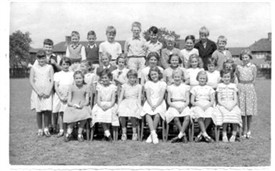Taking the Dreaded 11+ Exam
A Day to Remember
By Christine Gawthorpe nee Watts

Green Wrythe School. Summer of 1957
Donated by Christine Gawthorpe nee Watts
I attended Green Wrythe School for the whole of my school life, starting in the Infants age 5 and finishing in the Secondary School age 16. In January 1958, along with the other children of my age, I took the 11+ exam. The rest of the school had been given the day off - lucky them! - so as not to disturb the peace and quiet needed for the exam. I remember the day being dry, sunny, cold and frosty. It seemed odd that my year group were the only kids in the playground - there was so much empty space!
The tests started with the verbal reasoning part (an IQ test). We'd had practice at these sort of questions - I found them relatively easy to do. After break, we had the maths exam. I didn't find that particularly difficult either, but I seemed to finish before the other children, which may not have been a good sign. After lunch, we had English. It was my favourite subject and I loved writing essays. I picked the essay subject 'A Journey By Night.' I seem to remember I spent so much preamble on the build-up to the journey, there was very little time to write about the journey itself.
A few weeks later a buff envelope landed on the doormat, informing my parents that I was a 'borderline case'. Consequently I was invited to take another exam, whereupon my fate would be sealed. This time the test was to be held at Winchcombe School. Quite a number in my class had received similar letters, so off we all trooped on the appointed day to jump through even more hoops which the Education Office required us to do.
In due course another letter was received by my parents, stating that I hadn't 'passed' the exam and that there was a place for me at Green Wrythe Secondary School along with all the other 'failures'.
Being part of the post-war 'baby bulge' generation, there were 3 classes in the junior school for children of my age group - let's say each having 25 children, a total of 75. Out of that number, only 3 children 'passed' - that is only 4% of the year group. These lucky 3 went to the grammar schools at Mitcham.
When the Estate was built, good provision was made for primary and secondary modern education, but no secondary technical schools (which existed in many local authorities in those days), and certainly no grammar schools. No wonder hardly anybody passed the 11+, because there was nowhere to send them. Sutton, Mitcham and Carshalton 'posh part' had their long established grammar schools and obviously their own intake areas, defined before the Estate was built. They could hardly be expected to absorb large numbers of St Helier kids.
The pass rate differed from area to area within the UK, depending on population numbers, the ratio of children to schools, and so on - for example, in Wales, the pass rate was around 25% because it had ample grammar schools. It was definitely a 'postcode lottery' situation - although I do appreciate that postcodes weren't around in those days!
When I reached the Secondary School, my form was told by the headmistress, Mrs Lavery, that we should all have been placed in a grammar school, and that she was going to give us a grammar school education. True, we did learn Latin, but only for 2 years - and we were able to stay on at school until the age of 16 to study a limited range of GCE subjects, which, for a secondary modern school, was a rarity. The subject range did not include maths.
It is obvious that the powers-that-be (or were) thought that the children of the Estate would never amount to much and would be assimilated into working-class jobs. I am sure that there was a great wastage of talent at the time and in this sense I definitely feel that I was a victim of my environment, along with many others.